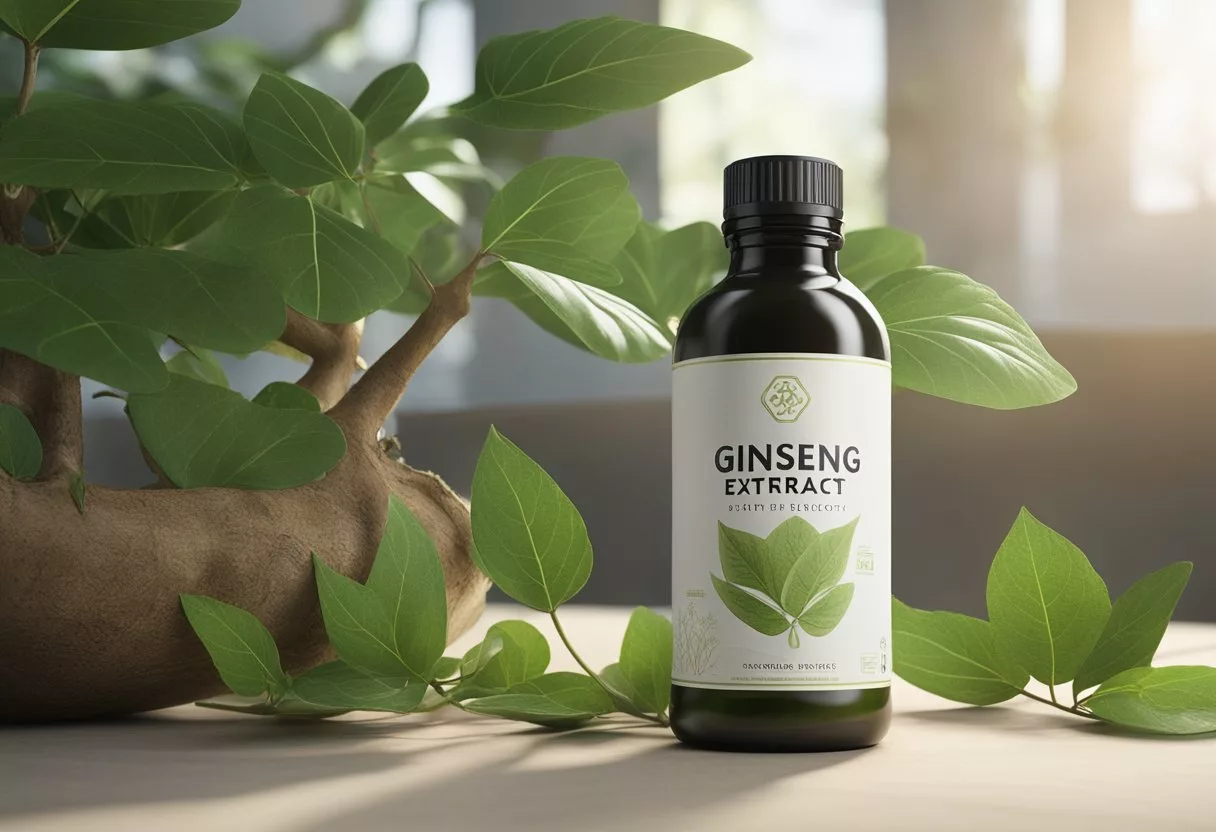Ginseng is a popular herbal remedy that has been used for centuries in traditional medicine. It is believed to have a wide range of health benefits, including improving brain function, reducing inflammation, and boosting the immune system. Ginseng is available in different forms, including capsules, powders, teas, and extracts, and can be consumed in various ways.

Ginseng is a slow-growing plant that belongs to the Araliaceae family and is native to Asia and North America. It has a fleshy root that is used for medicinal purposes. The plant has been used for thousands of years in traditional Chinese medicine to treat a variety of ailments, including fatigue, stress, and respiratory infections. Ginseng is also used in Korean and North American traditional medicine.
Ginseng is considered an adaptogen, which means it helps the body cope with stress and maintain homeostasis. It contains several active compounds, including ginsenosides, polysaccharides, and polyacetylenes, which are believed to be responsible for its health benefits. In this article, we will explore the potential health benefits of ginseng, its forms and consumption, safety and side effects, research and studies, dosage and recommendations, and frequently asked questions.
Key Takeaways
- Ginseng is a slow-growing plant with a fleshy root that is used for medicinal purposes.
- Ginseng is believed to have a wide range of health benefits, including improving brain function, reducing inflammation, and boosting the immune system.
- Ginseng is available in different forms, including capsules, powders, teas, and extracts, and can be consumed in various ways.
History and Origin

Traditional Chinese Medicine
Ginseng has been used for medicinal purposes for over 5,000 years in traditional Chinese medicine [1]. The Chinese believe that ginseng has the ability to promote longevity and vitality. According to the Chinese, ginseng can help to improve overall health, boost energy levels, and enhance mental function. They also believe that ginseng can help to prevent and treat a variety of health problems, including high blood pressure, diabetes, and respiratory infections.
Global Spread and Varieties
Ginseng is native to Asia and North America. The Asian ginseng (Panax ginseng) is commonly used in traditional Chinese medicine, while the American ginseng (Panax quinquefolius) is used in North America [2]. There is also Siberian ginseng (Eleutherococcus senticosus), which is not a true ginseng but has similar properties.
Ginseng has been widely cultivated around the world, including in Korea, Japan, Canada, and the United States. Each variety of ginseng has its unique properties and benefits. For example, American ginseng is believed to have a cooling effect on the body, while Asian ginseng is believed to have a warming effect [3].
Ginseng has a long history of use in traditional medicine, and its benefits have been studied extensively. While there is no doubt that ginseng has many health benefits, it is important to note that it is not a cure-all for all health problems. As with any supplement or medication, it is essential to speak with a healthcare professional before using ginseng to treat any health condition.
[1] Ancient herbal therapy: A brief history of Panax ginseng
[3] American Ginseng: Local Knowledge, Global Roots
Ginseng Composition

Ginseng is a plant that has been used in traditional medicine for centuries. It contains a variety of bioactive compounds that are responsible for its health benefits. The most well-known of these compounds are ginsenosides, which are found in the root of the plant.
Ginsenosides and Their Effects
Ginsenosides are a group of steroid-like compounds that are unique to ginseng. They are responsible for many of the plant's health benefits, including its ability to improve cognitive function, reduce inflammation, and boost the immune system.
Research has shown that ginsenosides can improve brain function by increasing blood flow to the brain and reducing oxidative stress. They can also help to reduce inflammation by inhibiting the production of pro-inflammatory cytokines.
In addition, ginsenosides have been shown to have antioxidant properties, which means they can help to protect the body against damage from free radicals. They can also help to boost the immune system by increasing the production of nitric oxide, a molecule that helps to fight off infections.
Other Bioactive Compounds
In addition to ginsenosides, ginseng contains a variety of other bioactive compounds, including polysaccharides and flavonoids. Polysaccharides are complex carbohydrates that have been shown to have immune-boosting properties. They can also help to reduce inflammation and improve blood sugar control.
Flavonoids are a group of plant compounds that have antioxidant properties. They can help to protect the body against damage from free radicals, which can contribute to the development of chronic diseases such as cancer and heart disease.
Overall, ginseng is a plant that contains a variety of bioactive compounds that are responsible for its health benefits. While ginsenosides are the most well-known of these compounds, other compounds such as polysaccharides and flavonoids also play a role in the plant's health-promoting effects.
Health Benefits

Ginseng has been used for centuries in traditional medicine for its various health benefits. Modern research has confirmed many of these benefits, making ginseng a popular supplement today. Here are some of the health benefits of ginseng:
Immune System Support
Ginseng has been found to have immune-boosting properties, which can help the body fight off infections and diseases. It has been shown to stimulate the production of white blood cells, which are responsible for fighting off infections. Ginseng may also help reduce the severity and duration of colds and flu.
Blood Sugar Regulation
Ginseng has been found to help regulate blood sugar levels, making it a potential treatment for diabetes. It may help improve insulin sensitivity and reduce insulin resistance. This can help improve glucose uptake by cells, which can lead to better blood sugar control.
Cognitive Function and Mood
Ginseng may help improve cognitive function and mood. It has been shown to improve memory, attention, and concentration. It may also help reduce symptoms of depression and anxiety, and improve overall mood. Ginseng may also have neuroprotective effects, which can help protect the brain from damage and degeneration.
Energy and Fatigue Reduction
Ginseng has been found to have energizing effects, which can help reduce fatigue and improve physical performance. It may also help improve endurance and reduce recovery time after exercise. Ginseng may also help improve mental energy and reduce mental fatigue.
Anti-Inflammatory and Antioxidant Effects
Ginseng has been found to have anti-inflammatory and antioxidant effects, which can help protect the body from damage and disease. It may help reduce inflammation and oxidative stress, which can contribute to chronic diseases such as cancer, heart disease, and diabetes.
Heart Health
Ginseng may help improve heart health by reducing blood pressure and cholesterol levels. It may also help improve blood flow and reduce the risk of blood clots. These effects can help reduce the risk of heart disease and stroke.
Sexual Health
Ginseng has been found to have potential benefits for sexual health. It may help improve erectile dysfunction in men, and improve sexual arousal and satisfaction in women. Ginseng may also help improve fertility in both men and women.
Overall, ginseng has many potential health benefits, and is a popular supplement for those looking to improve their health and well-being. However, it is important to speak with a healthcare professional before taking any new supplements, especially if you have any underlying health conditions or are taking any medications.
Forms and Consumption

Ginseng is available in various forms, including tea, powder, capsules, fresh and dried roots. Each form has its own unique benefits and drawbacks.
Tea and Beverages
Ginseng tea is a popular way to consume ginseng. It is made by steeping ginseng root in hot water. Ginseng tea is known for its calming and soothing effects. It is also believed to boost the immune system and improve mental clarity.
Other ginseng beverages, such as energy drinks and soft drinks, are also available. These beverages often contain added sugar and other ingredients, which may reduce the health benefits of ginseng.
Powder and Capsules
Ginseng powder and capsules are convenient ways to consume ginseng. They are made by grinding ginseng root into a fine powder and then encapsulating it. Ginseng powder and capsules are easy to take and can be consumed on-the-go.
However, it is important to note that ginseng powder and capsules may not be as potent as other forms of ginseng. The manufacturing process may reduce the amount of ginsenosides, the active compounds in ginseng, in the final product.
Fresh and Dried Roots
Fresh and dried ginseng roots are the most traditional forms of ginseng. They are often used in traditional Chinese medicine. Fresh ginseng roots are believed to be more potent than dried roots.
Dried ginseng roots can be steeped in hot water to make tea. They can also be used in cooking, such as in soups and stews. However, it is important to note that dried ginseng roots may not be as potent as fresh roots.
Overall, the form of ginseng that is best for an individual depends on their personal preferences and health goals. It is important to consult with a healthcare professional before consuming ginseng in any form.
Safety and Side Effects

Common Adverse Reactions
Ginseng is generally considered safe for most people when taken in recommended doses. However, some people may experience side effects such as headaches, insomnia, and digestive issues. In rare cases, ginseng can cause more serious side effects such as allergic reactions or toxicity. If you experience any adverse reactions while taking ginseng, stop using it and consult your doctor.
Interactions With Medications
Ginseng can interact with certain medications, including blood thinners such as warfarin and diabetes medications. It may also interact with stimulants, caffeine, and monoamine oxidase inhibitors (MAOIs). If you are taking any medications, it is important to talk to your doctor before taking ginseng.
Guidelines for Safe Use
To avoid potential side effects and interactions, it is important to follow certain guidelines when using ginseng. The FDA does not regulate ginseng supplements, so it is important to choose a reputable brand and follow the recommended dosage on the label. It is also important to talk to your doctor before taking ginseng, especially if you have any health conditions or are taking any medications.
In summary, ginseng can provide various health benefits but may also cause side effects and interact with medications. It is important to use it safely and responsibly by following recommended dosages and consulting with a doctor.
Research and Studies

Clinical Trials and Results
Numerous clinical trials have been conducted to investigate the potential health benefits of ginseng. A study published in the Journal of Ginseng Research [1] found that taking Panax ginseng daily for 12 weeks improved cognitive function in healthy adults. Another study [2] found that taking Korean red ginseng significantly improved symptoms of erectile dysfunction in men.
Ginseng has also been studied for its potential to reduce anxiety and improve mood. A randomized, double-blind, placebo-controlled study [3] found that taking a combination of American ginseng and Ginkgo biloba improved mood and cognitive function in healthy adults. Another study [4] found that Panax ginseng improved symptoms of depression in patients taking antidepressants.
In addition, ginseng has been studied for its potential to lower high blood pressure and reduce oxidative stress. A meta-analysis of 16 randomized controlled trials [5] found that ginseng significantly reduced systolic blood pressure in people with hypertension. Another study [6] found that taking Panax ginseng reduced oxidative stress in patients undergoing chemotherapy.
Emerging Research on Ginseng
Emerging research suggests that ginseng may have potential benefits for various health conditions. For example, a study published in the Journal of Medicinal Food [7] found that taking American ginseng reduced cancer-related fatigue in breast cancer survivors. Another study [8] found that taking Panax ginseng reduced the severity and duration of influenza and respiratory syncytial virus infections in mice.
Ginseng has also been studied for its potential to boost energy levels and improve mental performance. A randomized, double-blind, placebo-controlled study [9] found that taking Panax ginseng improved concentration and cognitive function in healthy adults. Another study [10] found that taking Korean red ginseng improved insulin production and blood flow in patients with diabetes.
Overall, while more research is needed to fully understand the potential health benefits of ginseng, these studies suggest that ginseng may have potential as an herbal medicine for a variety of health conditions.
[1] https://www.ncbi.nlm.nih.gov/pmc/articles/PMC3659633/
[2] https://pubmed.ncbi.nlm.nih.gov/21810191/
[3] https://www.ncbi.nlm.nih.gov/pmc/articles/PMC3153866/
[4] https://www.ncbi.nlm.nih.gov/pmc/articles/PMC3659633/
[5] https://www.ncbi.nlm.nih.gov/pmc/articles/PMC3659633/
[6] https://pubmed.ncbi.nlm.nih.gov/29916747/
[7] https://www.liebertpub.com/doi/10.1089/jmf.2019.0130
[8] https://pubmed.ncbi.nlm.nih.gov/32233391/
[9] https://pubmed.ncbi.nlm.nih.gov/29325481/
[10] https://www.ncbi.nlm.nih.gov/pmc/articles/PMC3659587/
Dosage and Recommendations
Determining the Right Amount
The appropriate dosage of ginseng can vary depending on the individual and the specific product being used. It is important to follow the recommended dosage instructions on the product label or as advised by a healthcare professional. The recommended dosage may also vary based on the form of ginseng being used, such as tablets, capsules, or tea.
It is generally recommended to start with a lower dose and gradually increase as needed. For example, a common dosage for American ginseng is 100-200 mg per day, while a common dosage for Asian ginseng is 1-2 grams per day.
Considerations for Different Populations
It is important to note that certain populations may require different dosages or should avoid ginseng altogether. For example, pregnant or breastfeeding women should avoid ginseng as there is not enough research to determine its safety in these populations. Additionally, ginseng may interact with certain medications such as selegiline, a medication used to treat Parkinson's disease.
Quality is also an important consideration when choosing a ginseng supplement. It is recommended to choose a reputable brand and to look for products that have been independently tested for purity and potency.
Overall, ginseng can be a beneficial supplement for some individuals, but it is important to use it appropriately and to consult with a healthcare professional before starting any new supplement regimen.
Frequently Asked Questions

How does ginseng consumption affect male sexual health?
Ginseng has been traditionally used to enhance male sexual function and is believed to improve erectile dysfunction. Some studies have shown that ginseng may increase testosterone levels and improve sperm quality in men. However, more research is needed to confirm these effects.
What are the potential skin care benefits of using ginseng?
Ginseng contains antioxidants that can help protect the skin from damage caused by free radicals. It may also help improve skin elasticity and reduce the appearance of wrinkles. Some studies have shown that ginseng may be effective in treating acne and other skin conditions, but more research is needed to confirm these effects.
Can women expect health benefits from taking ginseng?
Yes, women can also benefit from taking ginseng. Some studies have shown that ginseng may help reduce menstrual pain and improve symptoms of menopause, such as hot flashes and mood swings. It may also improve cognitive function and immune system function in women.
What are the daily effects of consuming ginseng regularly?
Consuming ginseng regularly may provide a variety of health benefits, including improved energy levels, reduced inflammation, and improved cognitive function. It may also help regulate blood sugar levels and reduce the risk of certain chronic diseases, such as heart disease and diabetes.
Are there any specific groups of people who should avoid ginseng?
People who are pregnant or breastfeeding should avoid ginseng, as it may have harmful effects on the developing fetus or infant. People with certain medical conditions, such as high blood pressure or diabetes, should also use caution when taking ginseng, as it may interact with certain medications.
What distinguishes Korean ginseng in terms of health benefits for women?
Korean ginseng is believed to have more potent health benefits for women than other types of ginseng. Some studies have shown that Korean ginseng may help improve symptoms of menopause, such as hot flashes and mood swings, and may also improve cognitive function and immune system function in women. However, more research is needed to confirm these effects.